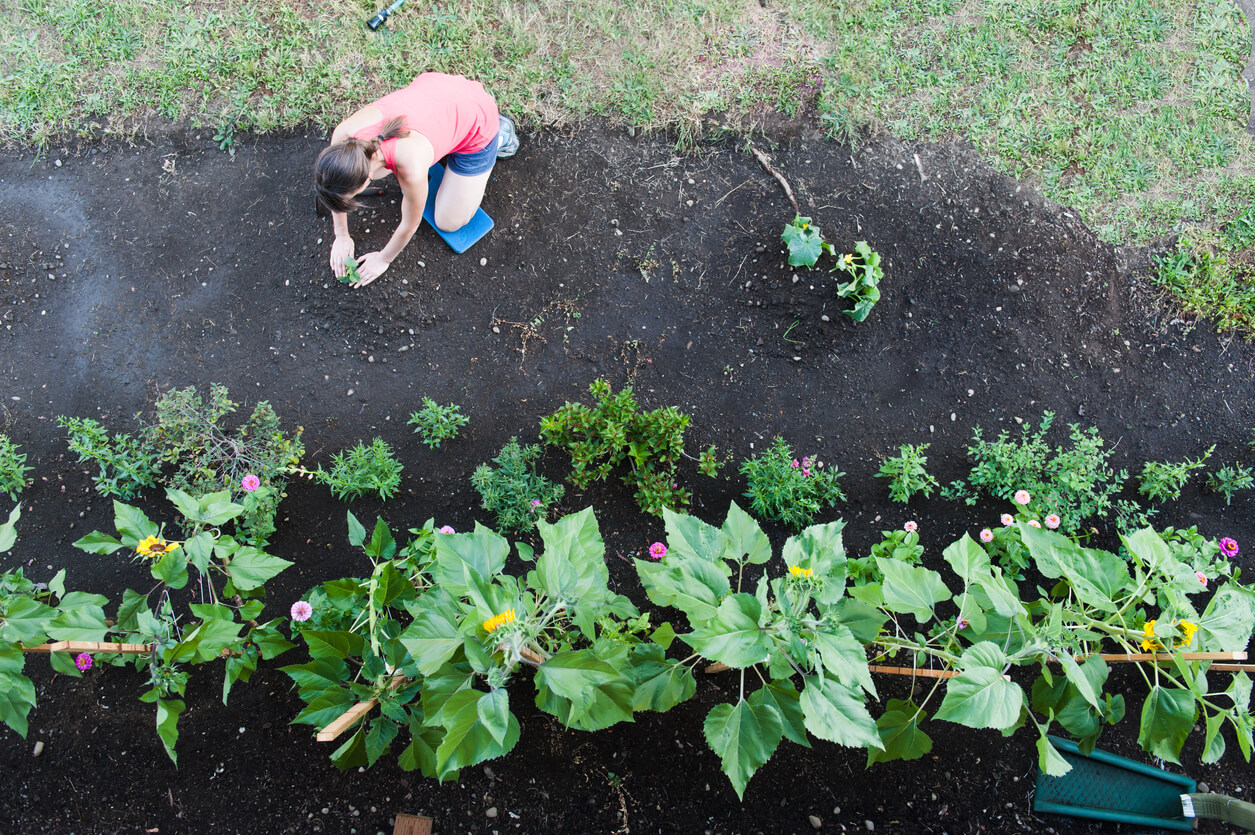
Gardener planting sunflowers and companion plants
Take advantage of organic teamwork in your garden to deter garden pests, as well as weeds. Companion planting is a great way help plants protect each other.
For example, squash, peas, and tomatoes are not a grasshopper’s favorite food. Adding these plants with your sunflowers can deter grasshoppers from gnawing on your sunflowers.
To help keep aphids at bay, plant chives along with your sunflowers.
Other companion plants work together with sunflowers, offering shade to seedlings, shading out weeds, and providing shade to cool-weather crops in the afternoon.
One crop not to plant with sunflowers: potatoes. Potatoes grow fast, and their roots can disrupt the roots of other plants around them. Potatoes are also prone to blight, which can easily spread to your sunflowers. So, planter beware.
Fennel isn’t a good companion choice either, because it sucks the nutrients out of the soil for itself, inhibiting the growth of plants around it. Hyssop is much the same; it’s a large plant, like the sunflower, and will aggressively compete for space and water.
With that warning out of the way, here are some of the plants that work as good garden companions for your sunflowers:
- Chives: Aphids are a major garden pest, but they don’t like chives. Plant chives around your sunflowers to give them an added layer of protection from these pesky pests.
- Corn: Like sunflowers, corn has tall stalks and deep roots. These two plants work together to reach deep into the soil for the nutrients they need to grow well.
- Crimson clover: This annual groundcover attracts beneficial insects, including essential pollinators as well as insects that feed on other insects that prey on sunflower plants. They also crowd out weeds that would otherwise compete with your sunflower plants for nutrients.
- Cucumbers: Cucumbers appreciate the afternoon shade that sunflowers can provide. They also may take advantage of the tall flower stalks to climb and grow. Sunflowers attract beneficial insects that have cucumber beetles at the top of their menu, giving you a natural pest control.
- Daisies: Daisies like to bloom in cooler conditions, and sunflowers can provide just the right amount of shade to shelter their delicate cousins.
- Marigolds: The powerful fragrance of marigolds is not appealing to many insects, making this low-growing flower a great companion for sunflowers.
- Onions and garlic: Onions do a great job repelling pests, clearing the way for friendly pollinators. And as your sunflowers grow, their large heads can provide some welcome afternoon shade. Garlic has an early harvest time, but the time it spends growing with your sunflowers is a key time to deter pests and keep them away for the rest of the growing season.
- Pumpkins and melons: The large pumpkin and melon leaves are natural weed fighters, shading out weeds while also helping keep moisture from evaporating from the soil too quickly, especially in the heat of summer when your sunflowers are growing.
- Squash and zucchini: The sunflowers attract pollinators to the squash blossoms, and the leaves shade the ground to keep out weeds and keep the soil surface cool. If you like to stake your zucchini plants, you can share a stake with a tall sunflower if your planting area is windy. And the sunflowers shade your squash from the afternoon sun.
- Tomatoes and peppers: Sunflowers act as aphid traps for tomatoes and peppers, which is great if salads and salsa are your goal. But if you’re trying to grow tomatoes, peppers, and sunflowers through to harvest, plant aphid-deterring chives.
- Lettuce: Sunflowers can provide just the right amount of afternoon shade to keep your lettuce happy.
- Columbine, heliotrope, lavender, ornamental onion, and yarrow: All of these plants make great deer deterrents, and can help protect your sunflowers from hungry deer.
Another great combination of companion plantings is something called the Four Sisters: the traditional Three Sisters (corn, squash, peas) with sunflowers. The sunflowers help by providing a climbing surface for the peas, and the peas return nitrogen to the soil, which sunflowers absorb with gusto.
Sunflowers can deter pests, support the growth of other crops, shade your cool-season crops from the harsh afternoon sun, and attract pollinators that some of your garden crops need–not to mention the fact that you’ll be making the bees and butterflies very happy. And your garden will look beautiful with a profusion of different types of plants together.
Do you plant your sunflowers with companion plants around them? Which plants do you use? Does companion planting help protect your sunflowers from pests? Do the sunflowers protect other crops from pests? Please share your experience with companion planting around sunflowers.


 Previous
Previous

